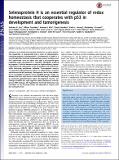Selenoprotein H is an essential regulator of redox homeostasis that cooperates with p53 in development and tumorigenesis
Author(s)
Cox, Andrew G.; Tsomides, Allison; Kim, Andrew J.; Saunders, Diane; Hwang, Katie L.; Evason, Kimberley J.; Heidel, Jerry; Brown, Kristin K.; Yuan, Min; Lien, Evan C.; Lee, Byung Cheon; Nissim, Sahar; Dickinson, Bryan; Chhangawala, Sagar; Asara, John M.; Houvras, Yariv; Gladyshev, Vadim N.; Goessling, Wolfram; Chang, Christopher J., 1974-; ... Show more Show less
DownloadCox-2016-Selenoprotein H is a.pdf (1.986Mb)
PUBLISHER_POLICY
Publisher Policy
Article is made available in accordance with the publisher's policy and may be subject to US copyright law. Please refer to the publisher's site for terms of use.
Terms of use
Metadata
Show full item recordAbstract
Selenium, an essential micronutrient known for its cancer prevention properties, is incorporated into a class of selenocysteine-containing proteins (selenoproteins). Selenoprotein H (SepH) is a recently identified nucleolar oxidoreductase whose function is not well understood. Here we report that seph is an essential gene regulating organ development in zebrafish. Metabolite profiling by targeted LC-MS/MS demonstrated that SepH deficiency impairs redox balance by reducing the levels of ascorbate and methionine, while increasing methionine sulfoxide. Transcriptome analysis revealed that SepH deficiency induces an inflammatory response and activates the p53 pathway. Consequently, loss of seph renders larvae susceptible to oxidative stress and DNA damage. Finally, we demonstrate that seph interacts with p53 deficiency in adulthood to accelerate gastrointestinal tumor development. Overall, our findings establish that seph regulates redox homeostasis and suppresses DNA damage. We hypothesize that SepH deficiency may contribute to the increased cancer risk observed in cohorts with low selenium levels.
Date issued
2016-09Department
Massachusetts Institute of Technology. Institute for Medical Engineering & Science; Harvard University--MIT Division of Health Sciences and TechnologyJournal
Proceedings of the National Academy of Sciences
Publisher
National Academy of Sciences (U.S.)
Citation
Cox, Andrew G. et al. “Selenoprotein H Is an Essential Regulator of Redox Homeostasis That Cooperates with p53 in Development and Tumorigenesis.” Proceedings of the National Academy of Sciences 113.38 (2016): E5562–E5571. © 2017 National Academy of Sciences
Version: Final published version
ISSN
0027-8424
1091-6490